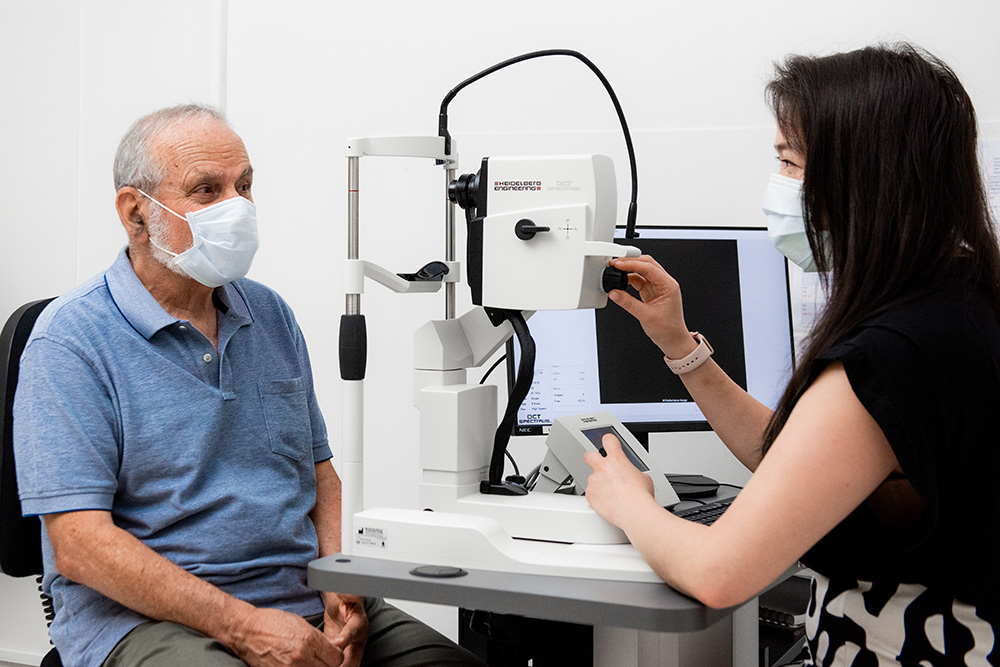Stories
Writing a new chapter
Tom Valenta has witnessed incredible progress in glaucoma research in less than two decades – and is doing his part to keep up the momentum.
Journalist, public relations consultant and author Tom Valenta was diagnosed with glaucoma in 2011.
The now 77-year-old was no stranger to the degenerative disease – he watched his mum’s eyesight diminish from it.
“There was virtually no treatment for glaucoma in those days,” says Tom.
“In the last decade of her life, she became close to totally blind.
“Her peripheral vision was always impacted. But towards the end, I’d have to stand in a particular place so she could see it was me.”
Glaucoma affects the optic nerve connecting the eye and the brain.
If left untreated, it can lead to permanent vision loss.
Around 300,000 Australians have glaucoma – but about half of these people don’t know it.
The slow progression of glaucoma means that many people with the disease don’t notice any symptoms until their vision loss is advanced.
Because of Tom’s family history of glaucoma, he had his eyes checked regularly for many years.
This meant it was caught early enough for treatment to be effective.
Tom manages his glaucoma with prescription eye drops.
Not only has this stopped his vision declining, but Tom says his eyesight has actually improved in recent years due to a change in medication.
“I am now no longer short-sighted and don’t need glasses for driving or watching sport.
“It’s the good news story in all of this.”
New treatments, better outcomes
Tom spends his time caring for his six grandchildren, keeping fit and pursuing his interest in writing and photography.
While no longer working professionally, his love of writing has seen him publish 13 books – with another on the way.
The impact of glaucoma on Tom’s vision is vastly different to his mother’s – largely due to advances in medical research and treatment over the past few decades.
“I believe I lead a very normal life,” Tom says.
“I’m not constrained or restricted in any way. I just read with level one glasses – a very easy, simple thing.
“I’m not at all impacted the way my mother was.”
Tom says he’s grateful for the researchers who have worked towards better treatments and experiences for people with glaucoma.
“Had there not been any treatment for me, there’s no doubt my glaucoma would have progressed,” he says.

Giving back
Just as CERA researchers are working to extend knowledge of glaucoma and other eye diseases, Tom is using his non‑fiction writing to build awareness and understanding of health and social issues.
This commitment to giving back has driven Tom to participate in three clinical trials with CERA since 2017.
These studies are essential to advance our understanding of glaucoma and find new treatments – and it’s volunteers like Tom who make them possible.
“The more we participate, the better the chances of improved medications for glaucoma, or even possibly a cure at some stage,” Tom says.
“They’ve got a fabulous team at CERA.
“Everyone I’ve dealt with impresses me with their dedication, their professionalism, and their capacity to explain what they’re doing and why they’re doing it.”
Tom says he’s optimistic about the future of glaucoma research, based on the significant progress he’s seen in the field since he was diagnosed 12 years ago.
He hopes his contribution can keep progressing this vital research.
“I hope that future generations will be free of glaucoma.”
Research impact
Dr Flora Hui is a clinician scientist at CERA who researches innovative ways to improve outcomes for people who don’t respond to current glaucoma treatments.
Her previous research determined that nicotinamide – a type of vitamin B3 – has the potential to boost the health of the cells that are affected in glaucoma.
She is currently undertaking a longer‑term trial to see if the supplement could be used in standard clinical care to help slow vision loss in glaucoma.
Dr Hui says that people like Tom who participate in clinical research make a remarkable and invaluable contribution to science.
“It would be impossible for us to find new and improved treatments for vision loss without people like Tom being so generous with their time,” she says.
She is also thankful to everyone who donates to research.
“All of the researchers at CERA are deeply grateful to the hundreds of people who contribute to make our achievements possible.”
